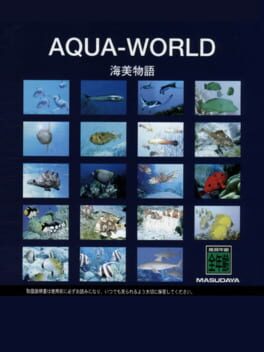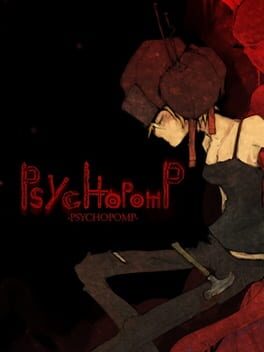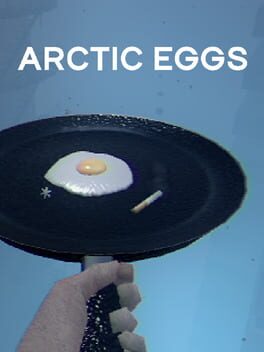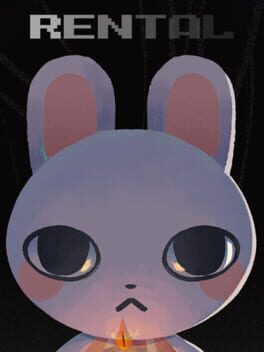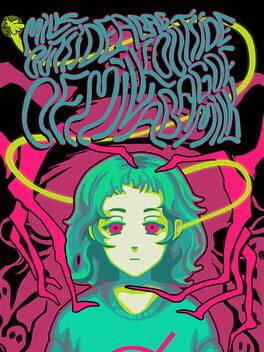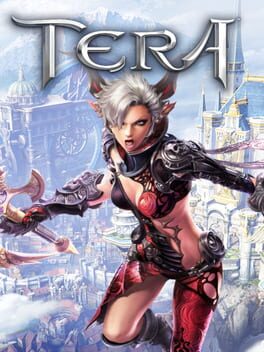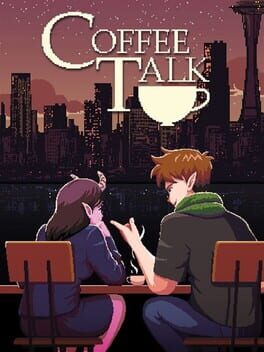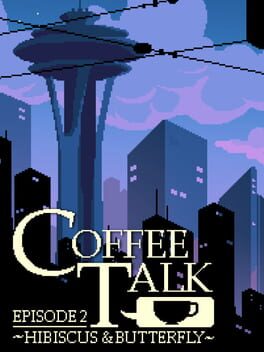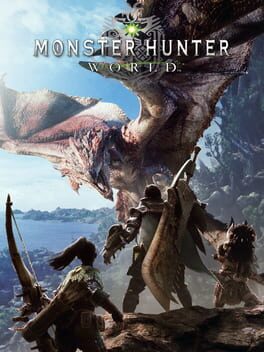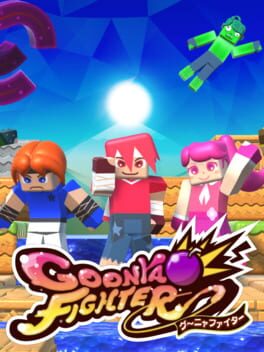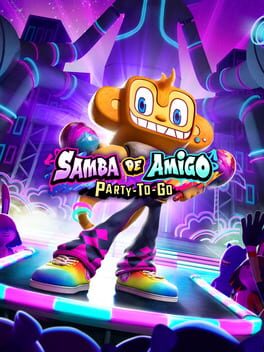jammerlammy_x
265 Reviews liked by jammerlammy_x
For many, the term FMV springs to mind exaggeration and oddity. Sprouting into popularity in the 90's with CD technology, the medium opened up new doorways in the games market to connect with the film industry. Actors, filmmakers, and producers could all invest in a new medium by recycling assets from their projects while the games industry could profit off of celebrity cultural capital injecting into the industry en masse. ["Repurposing", as Ted Hoff coined it (page 69)](https://books.google.com/books?id=wgsEAAAAMBAJ&lpg=PA69&vq=Johnny%20Mnemonic%3A%20The%20Interactive%20Action%20Movie%20%243%20million&pg=PA69#v=snippet&q=Johnny%20Mnemonic:%20The%20Interactive%20Action%20Movie%20$3%20million&f=false). However, many of these creatives found that translating production into video-based interactive games was an awkward process and the infamous performances from the era remain impressionable to this day.
Rarely though, do we speak of the games of the era that found something deeply beautiful in the form. I don't mean to say that the majorly known FMV games aren't beautiful; rather, that throughout the 90's there was a style of New Age FMV that tapped into a specific beauty of presenting images through the utopian ideals of the era's technology that needs to be recognized specifically aside from FMV at large.
I'm talking about CD-I Tetris. I'm talking about the Angel Paradise series. I'm talking about Aqua World: Umi Monogatari.
Aqua World: Umi Monogatari is a game about experiencing fish. You look at fish, you read about fish, you watch fish swim. That's pretty much the entire game, there's no walking around, no mechanics, you click a button and just watch fish. It's an absolutely breathtaking experience.
Part of the game's enjoyment is similar to that of watching a nature documentary. You get to see creatures moving around their ecosystem and doing their thing. What sets Aqua World: Umi Monogatari apart from nature documentary though is that it doesn't have any film of real fish, all of them are CGI videos of fish rendered in CDROM video. Their animations are repetitive, stiff, and float around in empty blue skyboxes which the camera occasionally teases as a real world space with reflections above. The models are lowpoly and just slightly cartoonish in the lack of details in which they are rendered. At times, they simply hover in space, motionless. And yet, this is where the beauty of the game lies.
Turning on Electric Blue mode, which is a rad name for your fish viewing game mode by the way, the player can choose from a variety of bouncing bubbles that determine a viewing order of fish videos. Upon playing, these CGI fish wander around on screen, each species with a different song to represent their personality. A haunting distorted synth wobbles as the Cresthead Flounder creeps on the ocean floor. A playful little tune sings as the Spotfin Frogfish wanders around curiously. If you have ever stopped in a moment of a videogame to look at the way the virtual ecosystem presents beauty to you then you have experienced a similar bliss as this one.
Aqua World is a game for enjoying the bliss of the videogame image. It is a game for finding peace that resides in the videogame image. It's in this embrace of bliss in the videogame image that I consider it to be "New Age FMV".
There aren't many interactions asked of the player in Aqua World: Umi Monogatari outside of this mode. On the menu there are two other options outside of Electric Blue; Data Fish, and Mermaid. Each of these modes essentially give the player different ways to experience the various species that the game presents. Data Fish presents encyclopedia entries, photographs, and 3D model inspections on the fish. Mermaid lets the player fill an aquarium with the game's included species and swim around to look at them.
It's easy to imagine Aqua World: Umi Monogatari gaining the reputation of being a "non-game" for the lack of deep mechanics for the player to engage in. However, I would argue that to play a videogame is to simply make an emotional connection with an intermix of hardware and software technologies. That can mean that simply moving your fish sprite around a virtual aquarium for the joy of seeing and hearing the ecosystem presented. It can mean reading through the encyclopedia entries of fish and seeing all the little photos and models included. It can mean choosing a selection of fish species clips to view on repeat and fall asleep to.
And what more could we ask for in videogames, than to find something which resonates with ourselves so deeply?
Rarely though, do we speak of the games of the era that found something deeply beautiful in the form. I don't mean to say that the majorly known FMV games aren't beautiful; rather, that throughout the 90's there was a style of New Age FMV that tapped into a specific beauty of presenting images through the utopian ideals of the era's technology that needs to be recognized specifically aside from FMV at large.
I'm talking about CD-I Tetris. I'm talking about the Angel Paradise series. I'm talking about Aqua World: Umi Monogatari.
Aqua World: Umi Monogatari is a game about experiencing fish. You look at fish, you read about fish, you watch fish swim. That's pretty much the entire game, there's no walking around, no mechanics, you click a button and just watch fish. It's an absolutely breathtaking experience.
Part of the game's enjoyment is similar to that of watching a nature documentary. You get to see creatures moving around their ecosystem and doing their thing. What sets Aqua World: Umi Monogatari apart from nature documentary though is that it doesn't have any film of real fish, all of them are CGI videos of fish rendered in CDROM video. Their animations are repetitive, stiff, and float around in empty blue skyboxes which the camera occasionally teases as a real world space with reflections above. The models are lowpoly and just slightly cartoonish in the lack of details in which they are rendered. At times, they simply hover in space, motionless. And yet, this is where the beauty of the game lies.
Turning on Electric Blue mode, which is a rad name for your fish viewing game mode by the way, the player can choose from a variety of bouncing bubbles that determine a viewing order of fish videos. Upon playing, these CGI fish wander around on screen, each species with a different song to represent their personality. A haunting distorted synth wobbles as the Cresthead Flounder creeps on the ocean floor. A playful little tune sings as the Spotfin Frogfish wanders around curiously. If you have ever stopped in a moment of a videogame to look at the way the virtual ecosystem presents beauty to you then you have experienced a similar bliss as this one.
Aqua World is a game for enjoying the bliss of the videogame image. It is a game for finding peace that resides in the videogame image. It's in this embrace of bliss in the videogame image that I consider it to be "New Age FMV".
There aren't many interactions asked of the player in Aqua World: Umi Monogatari outside of this mode. On the menu there are two other options outside of Electric Blue; Data Fish, and Mermaid. Each of these modes essentially give the player different ways to experience the various species that the game presents. Data Fish presents encyclopedia entries, photographs, and 3D model inspections on the fish. Mermaid lets the player fill an aquarium with the game's included species and swim around to look at them.
It's easy to imagine Aqua World: Umi Monogatari gaining the reputation of being a "non-game" for the lack of deep mechanics for the player to engage in. However, I would argue that to play a videogame is to simply make an emotional connection with an intermix of hardware and software technologies. That can mean that simply moving your fish sprite around a virtual aquarium for the joy of seeing and hearing the ecosystem presented. It can mean reading through the encyclopedia entries of fish and seeing all the little photos and models included. It can mean choosing a selection of fish species clips to view on repeat and fall asleep to.
And what more could we ask for in videogames, than to find something which resonates with ourselves so deeply?
Psychopomp
2024
Arctic Eggs
2024
Psychopomp
2024
Rental
2022
Rental
2022
Gu-L
2001
Trauma-induced delusions are one of the least supported and understood areas of mental health that is represented in media/larger society in general. So I was incredibly skeptical discovering there was a sequel to the original "bag of Milk" game.
The first game kind of felt like it was trying to express how the player cannot ever understand the experiences of those that exist within fiction and telling a challenging story within that. It follows a protagonist who is attempting to go outside of her home for the first time since her father died with monsters and cruel thoughts following her every step. Along the way the player is interacting with her thoughts and representing a sort of "medication" for her. This first game doesn't necessarily succeed in its aims. However due to it's short amount of timespan and ambiguity in low fidelity it surprisingly doesn't feel exploitative. Instead it just feels like a short story that presents us with ideas and images for us to carry and think about.
By making a second game in relation to this, I have to wonder what the goals are. Why do the ideas and images from the first title need to be expanded upon? Unfortunately it feels like "Milk outside" doubles down on the moments from the previous title as a means of reveling in traumatic iconography. This sheds the sympathetic lens formed from the first game's lo-fi constrained ambitions, and reveals a voyeuristic kaleidoscope of torturistic pleasure with higher fidelity animation and visuals.
I have heard there is some pretty cool stuff the game does with narrative structures and I also think it looks nice. However, I just don't feel a desire to play through more of this game's depictions of delusions and trauma.
The first game kind of felt like it was trying to express how the player cannot ever understand the experiences of those that exist within fiction and telling a challenging story within that. It follows a protagonist who is attempting to go outside of her home for the first time since her father died with monsters and cruel thoughts following her every step. Along the way the player is interacting with her thoughts and representing a sort of "medication" for her. This first game doesn't necessarily succeed in its aims. However due to it's short amount of timespan and ambiguity in low fidelity it surprisingly doesn't feel exploitative. Instead it just feels like a short story that presents us with ideas and images for us to carry and think about.
By making a second game in relation to this, I have to wonder what the goals are. Why do the ideas and images from the first title need to be expanded upon? Unfortunately it feels like "Milk outside" doubles down on the moments from the previous title as a means of reveling in traumatic iconography. This sheds the sympathetic lens formed from the first game's lo-fi constrained ambitions, and reveals a voyeuristic kaleidoscope of torturistic pleasure with higher fidelity animation and visuals.
I have heard there is some pretty cool stuff the game does with narrative structures and I also think it looks nice. However, I just don't feel a desire to play through more of this game's depictions of delusions and trauma.
Tera
2011
Coffee Talk
2020
A cozy feeling
I have always eyed this VN as I am a fan of coffee….. And cafes so this is very much my ally. As time went on however I just forgot about the game but seeing its sequel make its way to gamepass made me remember. Finally with my memory I could buy the first game on sale and sit down and read this wonderful story.
Short and simple
I will be keeping this review short and simple as there really isn’t a lot to talk about gameplay wise since this is a visual novel. Coffee talk is a Visual Novel that sees you play as a barista who runs a cafe that is only open during the night. The game revolves around the many characters that show up and the stories that follow them. The only gameplay element attached to this game is that you prepare drinks for the customers by combining ingredients to make Coffees , Tea, Green tea, chocolate and milk based drinks. Right off the bat the OST and graphics really put you at ease as the setting is just so peaceful to look at. Combine this with a great cast of characters and very well throughout and thoughtful stories this game is a very good time. I was taken back by some of the dialogue as some of the characters' issues presented are VERY real and the way they go about them are honestly good enough to the point that you can apply what these characters say to real life situations. I really appreciate how deep they get with specific topics that made me nod my head many times in agreement to what characters would say. Weirdly enough however, the only character I wasn’t really fond of is the main recurring character Freya. To explain , I found her dialogue sometimes to be annoying and honestly just found her character to be overall annoying multiple times during certain areas. Maybe her character will grow on me with the sequel so we shall see.
In the end
If you are a Visual novel fan and want to read a well written, thoughtful story with a great OST and great setting AND great characters then I highly recommend this game!. I am looking forward to reading the sequel !!!
I have always eyed this VN as I am a fan of coffee….. And cafes so this is very much my ally. As time went on however I just forgot about the game but seeing its sequel make its way to gamepass made me remember. Finally with my memory I could buy the first game on sale and sit down and read this wonderful story.
Short and simple
I will be keeping this review short and simple as there really isn’t a lot to talk about gameplay wise since this is a visual novel. Coffee talk is a Visual Novel that sees you play as a barista who runs a cafe that is only open during the night. The game revolves around the many characters that show up and the stories that follow them. The only gameplay element attached to this game is that you prepare drinks for the customers by combining ingredients to make Coffees , Tea, Green tea, chocolate and milk based drinks. Right off the bat the OST and graphics really put you at ease as the setting is just so peaceful to look at. Combine this with a great cast of characters and very well throughout and thoughtful stories this game is a very good time. I was taken back by some of the dialogue as some of the characters' issues presented are VERY real and the way they go about them are honestly good enough to the point that you can apply what these characters say to real life situations. I really appreciate how deep they get with specific topics that made me nod my head many times in agreement to what characters would say. Weirdly enough however, the only character I wasn’t really fond of is the main recurring character Freya. To explain , I found her dialogue sometimes to be annoying and honestly just found her character to be overall annoying multiple times during certain areas. Maybe her character will grow on me with the sequel so we shall see.
In the end
If you are a Visual novel fan and want to read a well written, thoughtful story with a great OST and great setting AND great characters then I highly recommend this game!. I am looking forward to reading the sequel !!!
A cozy feeling that continues in its sequel
Honestly this is just an overall good follow up to a very good first title which saw some improvements. The first title really put my mind at ease with its great setting, OST, characters and great dialogue that can sometimes get very thoughtful and deep. I simply couldn’t have asked for much more with the sequel and in every way they simply did what I think more games should do with its sequel. Don’t fix what isn’t broken just simply add onto it and improve and that is what you get with its sequel.
What is different and what is good?
Of course with this being a VN you ask yourself “what in the world can they change” which is a simple answer. The core loop of Coffee Talk EP1 has you creating drinks for your customers as you listen to their story. In EP2 you now have even more ingredients to use for your tasty looking drinks opening up how many possible combinations you can make. In addition there is a new side mechanic in which customers will sometimes forget items or give you items for you to give to someone else. This serves as a way for potential story changes for characters as you have to remember to give specific items to specific people. It's a neat mechanic which however does lead into a small issue I have that I will get more into in my negative portion of the review. What would be a good VN without good dialogue? Luckily I am happy to say this game continues the trend of great storylines with sometimes really thoughtful dialogue that can really hit home for some people if you are in the field of creating. In addition, the new cast of characters were great and all fit in very well to the story quickly making you care very deeply for these pixels. It's funny because I almost felt terrible when I had to go through my bad end run because I genuinely did not want to see these characters fail LOL.
A way to calm
I want to give this a little section on its own because I really want to drive home how comfy this game feels. They really created such a cozy atmosphere that I really adore and wish I could have in real life. The OST is just as great and the setting is once again just as great, really making you feel like you have gone back home. I really recommend this game just for this alone if you want something that will help you put yourself at ease while getting a fix of great stories and world building.
Some negatives
Luckily while I do have some negatives it isn’t anything game breaking that will push anyone away it's just annoyances for a specific group of people. To explain , remember how I mentioned the new item mechanic ? you get items from characters and pick up forgotten items from characters to give to another character or back to the person who lost it. It's a simple yet cool addition that can lead into some VERY frustrating routes if you do not want to guide. On top of having to get drinks right you have to remember to give items to specific people and if you forget anything you will ruin a run. This becomes an issue because this game is insanely confusing when it comes to 100% YOU WILL HAVE TO GUIDE THIS GAME. Going for a 100% playthrough without guiding will make you pull your hair out as it is so damn specific of what is needed from you. In general you will have to go through this game multiple times to see everything and this time around the dialogue skipping button feels slower due to the game pausing every time characters expression changes or anything. This will slow down the process a bit but not to an annoying degree.
In the end
While going for the true ending is annoying I will say I DO recommend it as it is one of the most heartfelt endings that I have seen in a while put into a game in recent times. It really elevated the experience for me and just really showed how close the team who made this game was. What is to come from this series is unknown ( to my knowledge ) but I am VERY happy to have picked up and read both titles.
Honestly this is just an overall good follow up to a very good first title which saw some improvements. The first title really put my mind at ease with its great setting, OST, characters and great dialogue that can sometimes get very thoughtful and deep. I simply couldn’t have asked for much more with the sequel and in every way they simply did what I think more games should do with its sequel. Don’t fix what isn’t broken just simply add onto it and improve and that is what you get with its sequel.
What is different and what is good?
Of course with this being a VN you ask yourself “what in the world can they change” which is a simple answer. The core loop of Coffee Talk EP1 has you creating drinks for your customers as you listen to their story. In EP2 you now have even more ingredients to use for your tasty looking drinks opening up how many possible combinations you can make. In addition there is a new side mechanic in which customers will sometimes forget items or give you items for you to give to someone else. This serves as a way for potential story changes for characters as you have to remember to give specific items to specific people. It's a neat mechanic which however does lead into a small issue I have that I will get more into in my negative portion of the review. What would be a good VN without good dialogue? Luckily I am happy to say this game continues the trend of great storylines with sometimes really thoughtful dialogue that can really hit home for some people if you are in the field of creating. In addition, the new cast of characters were great and all fit in very well to the story quickly making you care very deeply for these pixels. It's funny because I almost felt terrible when I had to go through my bad end run because I genuinely did not want to see these characters fail LOL.
A way to calm
I want to give this a little section on its own because I really want to drive home how comfy this game feels. They really created such a cozy atmosphere that I really adore and wish I could have in real life. The OST is just as great and the setting is once again just as great, really making you feel like you have gone back home. I really recommend this game just for this alone if you want something that will help you put yourself at ease while getting a fix of great stories and world building.
Some negatives
Luckily while I do have some negatives it isn’t anything game breaking that will push anyone away it's just annoyances for a specific group of people. To explain , remember how I mentioned the new item mechanic ? you get items from characters and pick up forgotten items from characters to give to another character or back to the person who lost it. It's a simple yet cool addition that can lead into some VERY frustrating routes if you do not want to guide. On top of having to get drinks right you have to remember to give items to specific people and if you forget anything you will ruin a run. This becomes an issue because this game is insanely confusing when it comes to 100% YOU WILL HAVE TO GUIDE THIS GAME. Going for a 100% playthrough without guiding will make you pull your hair out as it is so damn specific of what is needed from you. In general you will have to go through this game multiple times to see everything and this time around the dialogue skipping button feels slower due to the game pausing every time characters expression changes or anything. This will slow down the process a bit but not to an annoying degree.
In the end
While going for the true ending is annoying I will say I DO recommend it as it is one of the most heartfelt endings that I have seen in a while put into a game in recent times. It really elevated the experience for me and just really showed how close the team who made this game was. What is to come from this series is unknown ( to my knowledge ) but I am VERY happy to have picked up and read both titles.
Pentiment
2022
Happened to be reading 'Caliban and the witch' around the same time I was playing this, a great coincidence as it addresses a lot of the same historical events surrounding the game (revolts, taxes, Lutheranism, heresies... basically just about everything).
And being given even just a bit of context opens your eyes to how much care has gone into all things historical. Details, big or small, are everywhere, even those minute enough to go unnoticed by most people. Nonetheless, the sum of all these efforts gives it an atmosphere hard to replicate elsewhere. Despite spending most of your time walking from one place to another and talking to people, it's so captivating that you're as invested as the character you're playing as.
There's an interesting plot (which is hard to go into without spoilers), but that's only half of it. Because another great success is how Pentiment mixes the unusual with the mundane. In the midst of your investigations you're also exposed to the way the characters live. You learn about their views and values, their livelihood... and while at first it may come off as information for the cases, ultimately you've gotten to know them well enough and even empathize with some of them. As a historical work, it achieves its goal of familiarizing one with the past: highlighting its similarities and contrasts in order to show both the historical context of the people as well as how they're shaped by it.
In short, it makes you see the present in the past and vice versa: you can imagine how they would have fared under other circumstances (for example, not being restrained by becoming a nun).
In fact a lot of my enjoyment of the game was from stuff that may not be as important to the central story. Tiny bits of 'irrelevant' dialogue or small interactions and decisions you make throughout the which don't really affect the main plot. Yet being invested in the game makes them very satisfying. There are also enough minigames and small fun puzzles paced throughout the game to alternate with the narrative so that it never feels repetitive.
As for its style, it's amazing. Though it often aims for a more ordinary look to portray the town and its people, it can also be downright beautiful when it wants, often mimicking manuscripts or paintings. Either way it's one of the more unique looking games out there and that also extends to the menus like the map or your journal, the passing of time, and the written dialogue mechanic which also gets used nicely for the narrative.
That's because Pentiment also excels at taking fully advantage of the medium it's in. Many of the things it does and some of its best aspects work because it's a game.
It may have a well-researched bibliography during the credits but it's far from just an abridgement of that information in the form of a game. Stuff like interactivity plays a big role, because it's one thing to read that an event happened during a period of time and another to take part in it and even see how your involvement shapes the outcome. Thus I often was not only thinking about the mystery at hand being solved, but about its implications as well. Whether some lines of questioning were better left alone or if sometimes it was worth speaking the truth; and how this would impact the people around me.
It's a great game, but it also makes me happy that it's a game where it shows that they made what they wanted to do, and enjoyed doing it.
And being given even just a bit of context opens your eyes to how much care has gone into all things historical. Details, big or small, are everywhere, even those minute enough to go unnoticed by most people. Nonetheless, the sum of all these efforts gives it an atmosphere hard to replicate elsewhere. Despite spending most of your time walking from one place to another and talking to people, it's so captivating that you're as invested as the character you're playing as.
There's an interesting plot (which is hard to go into without spoilers), but that's only half of it. Because another great success is how Pentiment mixes the unusual with the mundane. In the midst of your investigations you're also exposed to the way the characters live. You learn about their views and values, their livelihood... and while at first it may come off as information for the cases, ultimately you've gotten to know them well enough and even empathize with some of them. As a historical work, it achieves its goal of familiarizing one with the past: highlighting its similarities and contrasts in order to show both the historical context of the people as well as how they're shaped by it.
In short, it makes you see the present in the past and vice versa: you can imagine how they would have fared under other circumstances (for example, not being restrained by becoming a nun).
In fact a lot of my enjoyment of the game was from stuff that may not be as important to the central story. Tiny bits of 'irrelevant' dialogue or small interactions and decisions you make throughout the which don't really affect the main plot. Yet being invested in the game makes them very satisfying. There are also enough minigames and small fun puzzles paced throughout the game to alternate with the narrative so that it never feels repetitive.
As for its style, it's amazing. Though it often aims for a more ordinary look to portray the town and its people, it can also be downright beautiful when it wants, often mimicking manuscripts or paintings. Either way it's one of the more unique looking games out there and that also extends to the menus like the map or your journal, the passing of time, and the written dialogue mechanic which also gets used nicely for the narrative.
That's because Pentiment also excels at taking fully advantage of the medium it's in. Many of the things it does and some of its best aspects work because it's a game.
It may have a well-researched bibliography during the credits but it's far from just an abridgement of that information in the form of a game. Stuff like interactivity plays a big role, because it's one thing to read that an event happened during a period of time and another to take part in it and even see how your involvement shapes the outcome. Thus I often was not only thinking about the mystery at hand being solved, but about its implications as well. Whether some lines of questioning were better left alone or if sometimes it was worth speaking the truth; and how this would impact the people around me.
It's a great game, but it also makes me happy that it's a game where it shows that they made what they wanted to do, and enjoyed doing it.
